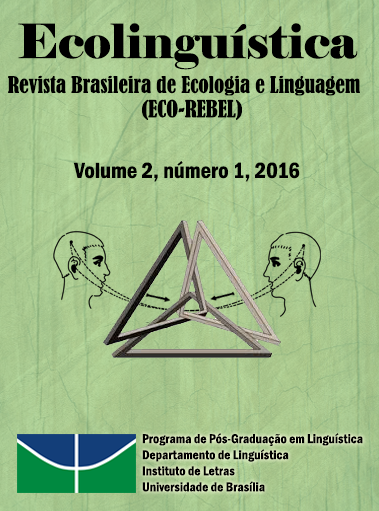When is the total not the whole?
Palabras clave:
Nationalism; language origin; language acquisition; language and world.Resumen
It seems possible that a basic misunderstanding of the importance of nationalism among those charged with undertaking language planning and especially those responsible for language-in-education planning may actually be an underlying cause for failure. The issue of nationalisminvolves the junction of two distinct domains -- the domain of ethnic and cultural issues and the domain of political organization. In addition, the matter of nationalism requires some understanding of what language is and what role it plays. Defining language starts by discussing the origin of language ”“ where did it come from? The origin of language is difficult to study in the absence of any direct evidence, so scholars have had to draw inferences from other kinds of information; e.g., from fossil records, archeological evidence, the vast diversity of living languages, language acquisition and language learning, as well as comparisons between human languages and the various modes of communication employed by animals, birds, and insects. The language one uses is shaped by the society in which one lives; that society is shaped by the language used by speakers who inhabit the society. The difference between languages lies not in grammar and vocabulary but rather in the world of metaphor.
Descargas
Citas
AMMON, U. English(es) and Academic Publishing. In C. Chapelle (Ed.) The Encyclopedia of Applied Linguistics. (10 Vols.) Hoboken, NJ: John Wiley, 2013.
ANDERSON, B. Imagined communities: Reflections on the origin and spread of nationalism. London: Verso, 1996.
BRUBAKER, R. Ethnicity without Groups. Cambridge, MA: Harvard University Press, 2006.
CHOMSKY, N. Syntactic Structures. Berlin: Mouton de Gruyter, 2002.
CHOMSKY, N. Aspects of the Theory of Syntax. Cambridge, MA: MIT Press, 1965.
GAL, S. & IRVINE, J. T. The boundaries of languages and disciplines: How ideologies construct difference. Social Research 62, 1995, p. 967-1001.
GLIEDMAN, J & CHOMSKY, N. Things No Amount of Learning Can Teach. Chomsky interview with John Gliedman. November 1983. Retrieved December 27, 2015, Omni, 6:11. https://chomsky.info/198311, 1983.
GORDON, R. G., Jr. (ed.). Ethnologue: Languages of the World (Fifteenth edition). Dallas, Texas: SIL International, 2005.
HALLIDAY, M. A. K. Language as Social Semiotic: The Social Interpretation of Language and Meaning. London: Edward Arnold, 1978.
_______. & R. Hasan. Language, Context and Text: Aspects of Language in a Social-Semiotic Perspective. Oxford: Oxford University Press, 1989.
KACHRU, B. B., KACHRU, Y. & SRIDHAD, S. N. (eds). Language in South Asia. New York; Cambridge University Press, 2008.
KAMWANGAMALU, N. Language Policy and Economics:The Language Question in Africa. London: Palgrave Macmillan, (forthcoming).
_______. Multilingualism and education policy in post-apartheid South Africa. Language Problems & Language Planning 21, 1997, p. 234”“253.
KAPLAN, R. B. A Metaphor is a many-splendored thing. In D. HOLLÓ, & K. KÁROLY (eds.). Inspirations in Foreign Language Teaching: Studies in Language Pedagogy and Applied Linguistics in Honour of Péter Medgyes. Harlow: Pearson Education, 2015, p. 222-242.
_______. I never metaphor I didn’t like. Applied Linguistics Interest Section of TESOL AL Forum, 2014, (5 pp. unnumbered.)
_______. Language management theory: From The Prague Circle to the present. Journal of Multilingual and Multicultural Development 32 (1), 2011, p. 85-93.
_______. English--the Accidental Language of Science? In U. Ammon (Ed.) The Dominance of English as a Language of Science: Effects on Other Language Communities. Berlin: Mouton de Gruyter, 2001, p. 3-26.
_______; BALDAUF, R. B. North Korea's Language Revision and Some Unforeseen Consequences. In O. Garcia and J.A. Fishman (eds.). Handbook of Language and Ethnic-Identity: The Success-Failure Continuum in Language and Ethnic Identity Efforts. New York: Oxford University Press, 2011.
KAPLAN, R.B., R. B. BALDAUF, JR., & N. M. KAMWANGAMALU. Why educational language plans sometime fail. In R. B. BALDAUF, Jr., R. B. KAPLAN, N. M. KAMWANGAMALU & P. BRYANT (eds.). Language Planning in Primary Schools in Asia. New York & London: Routledge, 2012, p. 1-20.
LARSON, B. Metaphors for environmental sustainability:Redefining our relationship with nature. New Haven: Yale University Press, 2011.
MÜHLHÄUSLER, P. Language of Environment, Environment of Language: A Course in Ecolinguistics. London: Battlebridge, 2003.
MÜLLER, F. M. The theoretical stage, and the origin of language. Lecture 9 from Lectures on the Science of Language. Reprinted in R. HARRIS (ed.). The Origin of Language (p. 7-41). 1996 [1861] Bristol: Thoemmes Press.
RENAN, E. Qu'est-ce qu'une nation? [What is a Nation?] Discours et Conferences. Paris: Caiman-Levy, 1887.
ROBERTSON, D. S. The new Renaissance: Computers and the next level of civilization. Oxford: Oxford University Press, 1998.
TRASK, R. L. Key Concepts in Language and Linguistics. Routledge: London and New York, 1999.
WEBER, M. La ville. Paris, La Découverte, 2014.
Youmans, M. Chicano-Anglo Conversations: Truth, Honesty and Politeness. Mahwah, NJ: Lawrence Erlbaum, 2007.
ZHOU, M. L. (ed.). Language Policy in the People’s Republic of China: Theory and Practice since 1949. Dordrecht & Boston: Kluwer Academic, 2004.
Descargas
Publicado
Cómo citar
Número
Sección
Licencia
Autores que publicam nesta revista concordam com os seguintes termos:
Autores mantêm os direitos autorais e concedem à revista o direito de primeira publicação, sendo o trabalho simultaneamente licenciado sob a Creative Commons Attribution License o que permite o compartilhamento do trabalho com reconhecimento da autoria do trabalho e publicação inicial nesta revista.
Autores têm autorização para assumir contratos adicionais separadamente, para distribuição não exclusiva da versão do trabalho publicada nesta revista (ex.: publicar em repositório institucional ou como capítulo de livro), com reconhecimento de autoria e publicação inicial nesta revista.
Autores têm permissão e são estimulados a publicar e distribuir seu trabalho online (ex.: em repositórios institucionais ou na sua página pessoal) a qualquer ponto antes ou durante o processo editorial, já que isso pode gerar alterações produtivas, bem como aumentar o impacto e a citação do trabalho publicado (Veja O Efeito do Acesso Livre).



3.png)



